 Petzlover
Petzlover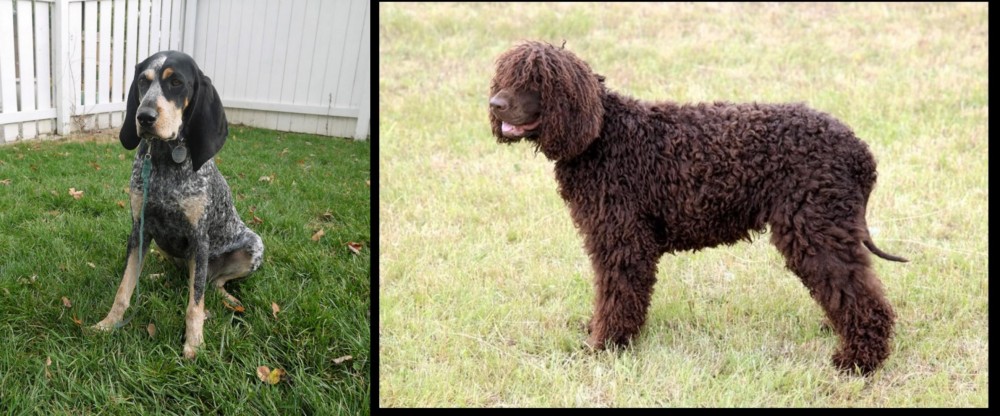 Grand Bleu de Gascogne is originated from France but Irish Water Spaniel is originated from Ireland. Grand Bleu de Gascogne may grow 13 cm / 6 inches higher than Irish Water Spaniel. Grand Bleu de Gascogne may weigh 12 kg / 27 pounds more than Irish Water Spaniel. Both Grand Bleu de Gascogne and Irish Water Spaniel has same life span. Grand Bleu de Gascogne may have less litter size than Irish Water Spaniel. Grand Bleu de Gascogne requires Low Maintenance. But Irish Water Spaniel requires Moderate Maintenance
Grand Bleu de Gascogne is originated from France but Irish Water Spaniel is originated from Ireland. Grand Bleu de Gascogne may grow 13 cm / 6 inches higher than Irish Water Spaniel. Grand Bleu de Gascogne may weigh 12 kg / 27 pounds more than Irish Water Spaniel. Both Grand Bleu de Gascogne and Irish Water Spaniel has same life span. Grand Bleu de Gascogne may have less litter size than Irish Water Spaniel. Grand Bleu de Gascogne requires Low Maintenance. But Irish Water Spaniel requires Moderate Maintenance
 The Grande Bleu de Gascogne is a dog which has descended from a line of French hounds. Originating in France, the dog is actually more common in the United States than in France.
The Grande Bleu de Gascogne is a dog which has descended from a line of French hounds. Originating in France, the dog is actually more common in the United States than in France.
They were bred to hunt, and today they continue to be used for hunting, but they double up as loyal pets too.
It is believed that they descended from dogs such as the St. Hubert Hound and the English Southern Hound. The dog itself has had an influence on the development of several scent-hound breeds.
In the United States, the Grande Bleu de Gascogne was bred in the 18th century already, displaying typical pack hound behavior.The dog isn't recognized by the AKC but he is recognized by other kennel clubs as a scenthound.
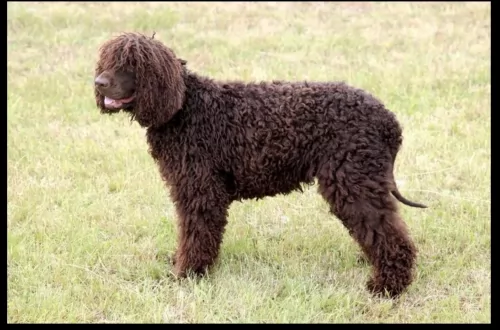 The Irish Water Spaniel is one of the larger spaniel types and also one of the oldest.
The Irish Water Spaniel is one of the larger spaniel types and also one of the oldest.
He is sometimes referred to as the Southern Irish Water Spaniel. Hailing from Ireland, the precise origins of the dog aren't altogether sure. It is believed that the dog came from other dogs from Persia and there are references to these water dogs from as early as 1600.
The modern breed was developed in Ireland in the 1830s. The breed's purpose is that of a hunter of waterfowl and he swims strongly.
The Irish Water Spaniel was recognized by the AKC in 1884. In 1890 the Irish Water Spaniel Club was formed.
 The Grand Bleu de Gascogne is a large dog, standing at 65–72cm with the female usually being slightly smaller at 62–68cm. The dog weighs about 36 to 42kg.
The Grand Bleu de Gascogne is a large dog, standing at 65–72cm with the female usually being slightly smaller at 62–68cm. The dog weighs about 36 to 42kg.
He has a lean, muscular body with long legs, long ears and with a strong, noble appearance. The coat is short and smooth and the color of the coat is white and black mottled. In some instances, there'll be large patches of black over the back of the dog. The head and neck area can also be black. There are tan markings above each eye.
This is a gentle dog, not aggressive at all, and he just wants to get on with hunting. He is a social dog and loves to be around other familiar dogs and his human family. He essentially wants to live in the country where he can be busy and active with tasks to do.
If you leave him alone for too long, he becomes frustrated and resorts to baying. He can get on well with adults and children in the home, but tends to be aloof around strangers. He is an intelligent animal, and training and socialization will be important for him, especially since he is independent and likes doing things his way.
The training will make him obedient and he'll always know how to behave well around strangers.
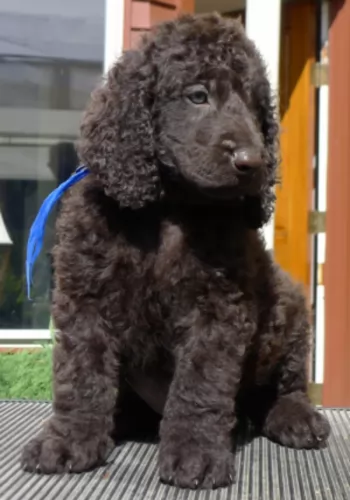 A peculiar feature of this dog is its hairless tail which is partly covered in curls which the rest is all but hairless, giving him the nickname of Rat Tail or Whip Tail.
A peculiar feature of this dog is its hairless tail which is partly covered in curls which the rest is all but hairless, giving him the nickname of Rat Tail or Whip Tail.
Looking much like a Poodle with his tight oily curls, the Irish Water Spaniel is a medium to large sized purebred dog, a robust, compact built dog with a skull which is shaped like a dome.
The muzzle is longish, the eyes dark brown and intelligent looking and the ears are long and floppy.
His hair is thick and curly and it sheds very little so that the dog is regarded as being hypoallergenic. The medium length coat is a dark brown, liver color with fairly tight curls that may even tend to cover the eyes.
It is interesting to note that he has webbed feet, which is useful for when the dog swims.He stands at roughly 51cm to 61cm and weighs between 25 to 30kg.
Temperament in any dog is affected by socialization and the way the human owner raises the dog. The Irish Water Spaniel is a water loving dog, being active and energetic.
He is an intelligent dog and easy to train and socialize. When trained he becomes such an obedient dog. He has also got a light-hearted side to him and is actually known to be quite amusing and clownish, providing plenty of laughs for you.
They make good family dogs, getting on well with children in the home as well as with other pets. They're also able to make good guard dogs, taking the protective roles seriously. He isn't an aggressive dog but he has a warning bark that can be a good warning to intruders.
 Your beautiful hunting dog is active and social and just loves to be out and about following a scent with other hunting dogs. This is what he absolutely loves to do.
Your beautiful hunting dog is active and social and just loves to be out and about following a scent with other hunting dogs. This is what he absolutely loves to do.
These days, apart from just hunting, he is also kept as a pet. He makes a good family companion because he is a non aggressive, gentle, even-tempered pet. Some of these dogs tend to be more reserved in nature. However your dog turns out, he can be your special friend when you give him all the exercise, nutrition and love that such a loyal dog deserves.
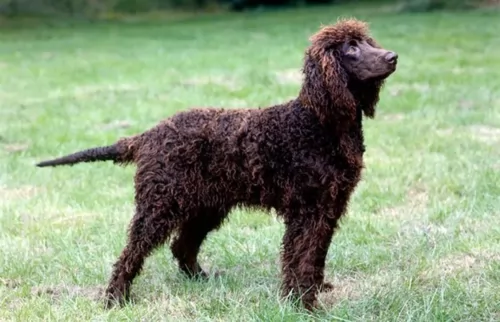 Your active Irish Water Spaniel just loves water so you can count him in whenever you go swimming. That is one characteristic of the Irish Water Spaniel – he just loves to be involved in all the action you're busy with.
Your active Irish Water Spaniel just loves water so you can count him in whenever you go swimming. That is one characteristic of the Irish Water Spaniel – he just loves to be involved in all the action you're busy with.
He makes an ideal family pet for an active family, and he will be a loyal and devoted pet who will provide a lot of fun to your family with his mischievous side.
He is confident, independent and strong willed so first time dog owners should bear this in mind. He is essentially just a fun loving, busy dog and if you make sure to exercise him well and make sure he is a participating member of your family, he'll be your most loving and devoted friend.
 As a dog not known for inherited health problems, the Grande Bleu de Gascogne, with good care, can live to be 12 years of age.
As a dog not known for inherited health problems, the Grande Bleu de Gascogne, with good care, can live to be 12 years of age.
Just like with other dog breeds, there are some conditions to which this dog may also be prone, and hip dysplasia is one.
The average litter size for the Grande Bleu de Gascogne is 4 to 7 puppies. It is important to prevent your puppy growing too quickly because this is precisely what leads to musculoskeletal problems as an adult.
If you're concerned about this, speak to your vet, as you want to do your best to prevent hip problems in the future.
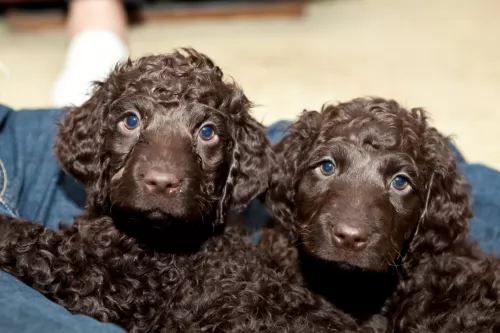 A generally healthy breed, the Irish Water Spaniel, just like with most other dogs, can fall prey to some of the more common dog ailments of which hip dysplasia is one.
A generally healthy breed, the Irish Water Spaniel, just like with most other dogs, can fall prey to some of the more common dog ailments of which hip dysplasia is one.
Bone and joint problems like this can lead to lameness even in young dogs.
Eye diseases are also a problem, and cataracts can form in the eye, particularly when the dog is older and create a cloudy look to the eye. It's not painful for the dog.
Hypothyroidism, a treatable hormonal disorder is another disease worth being aware of.
 Known for his hunting skills, the Grande Bleu de Gascogne has high exercise requirements. Although a walk is wonderful for him, it won't be enough. If you have a large garden, which will be ideal for him, throw the ball so he can fetch it. If you go cycling or jogging, he'll thank you for including him in these.
Known for his hunting skills, the Grande Bleu de Gascogne has high exercise requirements. Although a walk is wonderful for him, it won't be enough. If you have a large garden, which will be ideal for him, throw the ball so he can fetch it. If you go cycling or jogging, he'll thank you for including him in these.
The Grand Bleu’s short coat is conveniently low maintenance too so you aren't going to be spending anything on professional grooming. Give him a brush twice a week to remove loose hairs and to keep his coat silky and shiny.
Their long ears should be checked regularly for a build up of wax and dirt. Dampness can also be a problem if he loves to go swimming. You can buy special ear-cleaning-for-dog products. Never probe deep in the ears as you can damage them. Rather get advice from your vet or professional groomers on how to keep the inside of his ears clean and free from infection.
An energetic hunting scentdog like this requires high quality food with some raw meat added in from time to time. He must always have access to fresh, cool water.
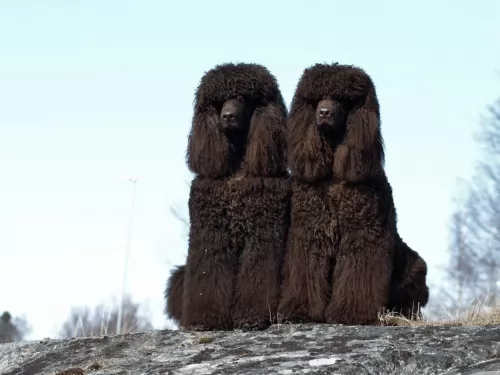 Your Irish Water Spaniel requires quite a bit of grooming that will involve his coat, his nails, his teeth and his ears. The double coat doesn't shed much so it can be easily maintained by brushing the coat twice a week.
Your Irish Water Spaniel requires quite a bit of grooming that will involve his coat, his nails, his teeth and his ears. The double coat doesn't shed much so it can be easily maintained by brushing the coat twice a week.
It can help your water spaniel to look good by sending him in to a doggy grooming parlor to have his curls neatened. This is a dog that loves water and swimming, and you will need to check the inside of his ears for dampness, wax build-up and debris. This can all combine to cause nasty ear infections.
The dog is energetic and will need to be exercised. Take him for walks, play ball games with him and allow him to go on hikes with you or to go swimming. He loves being involved in all your activities as he is a social, active dog.
Highly energetic, it will be important to feed your Irish Water Spaniel with food that enhances his energy levels. There are some good quality commercially manufactured dog foods on the market. Choose one that caters for active, athletic dogs such as the Irish Water Spaniel.
Dry kibble is more recommended to prevent canine tooth decay. Mix in some home cooked foods from time to time such as cooked chicken, rice, pasta and vegetables and try to include some raw meat every now and then as well. Make sure he has constant access to fresh, cool water.